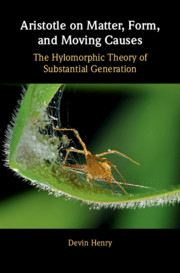Book contents
- Aristotle on Matter, Form, and Moving Causes
- Aristotle on Matter, Form, and Moving Causes
- Copyright page
- Dedication
- Contents
- Preface and Acknowledgements
- Abbreviations of Aristotle’s Works
- Introduction
- Chapter 1 Preliminary Puzzles
- Chapter 2 The Hylomorphic Model of Substantial Generation: Physics I
- Chapter 3 Substantial versus Non-Substantial Change: GC I 1–4
- Chapter 4 The Extended Hylomorphic Model: GC II 9
- Chapter 5 Biological Generation: Part One
- Chapter 6 Biological Generation: Part Two
- Chapter 7 The Efficient Cause of Animal Generation
- Chapter 8 The Architectonic Model
- Chapter 9 The Cosmological Significance of Substantial Generation
- Bibliography
- Index Locorum
- Subject Index
Introduction
Published online by Cambridge University Press: 14 November 2019
- Aristotle on Matter, Form, and Moving Causes
- Aristotle on Matter, Form, and Moving Causes
- Copyright page
- Dedication
- Contents
- Preface and Acknowledgements
- Abbreviations of Aristotle’s Works
- Introduction
- Chapter 1 Preliminary Puzzles
- Chapter 2 The Hylomorphic Model of Substantial Generation: Physics I
- Chapter 3 Substantial versus Non-Substantial Change: GC I 1–4
- Chapter 4 The Extended Hylomorphic Model: GC II 9
- Chapter 5 Biological Generation: Part One
- Chapter 6 Biological Generation: Part Two
- Chapter 7 The Efficient Cause of Animal Generation
- Chapter 8 The Architectonic Model
- Chapter 9 The Cosmological Significance of Substantial Generation
- Bibliography
- Index Locorum
- Subject Index
Summary
This book is an inquiry into an important yet neglected area of Aristotle’s philosophy: the generation of substances. All change for Aristotle is a form of coming-to-be (or passing-away) in some sense. With some changes the substance already exists and simply becomes qualified in some way, as for example when Socrates (a substance) comes to be healthy from being unhealthy (a change in quality) or comes to be bigger from being smaller (a change in quantity). Aristotle calls this coming-to-be in the qualified sense (gignesthai ti). In cases of substantial generation (what Aristotle calls coming-to-be in the unqualified sense, gignesthai haplôs) the change results in a new substance coming into existence. At the end of development, we say that Socrates has come to be (full stop) rather than saying he has come to be F. This distinction was not universally accepted by Aristotle’s predecessors.
- Type
- Chapter
- Information
- Aristotle on Matter, Form, and Moving CausesThe Hylomorphic Theory of Substantial Generation, pp. 1 - 20Publisher: Cambridge University PressPrint publication year: 2019



